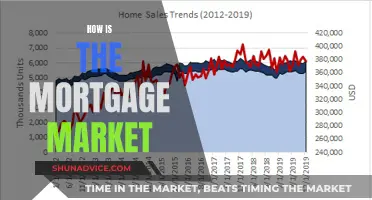
The mortgage industry is highly regulated at both the state and federal levels. The federal government regulates the mortgage industry through a variety of agencies and congressional acts, such as the Truth in Lending Act (TILA) and Regulation Z, which are designed to protect consumers from unfair and deceptive practices. The Consumer Financial Protection Bureau (CFPB), an independent government agency, enforces financial and consumer protection laws, while the Federal Reserve supervises the banking industry, including mortgage lenders. State regulatory departments are also responsible for overseeing financial institutions, with each state having at least one such department. These regulations aim to ensure fair and equitable treatment of borrowers, protect consumers from predatory lending practices, and maintain the stability of the mortgage market.
| Characteristics | Values |
|---|---|
| Regulating Bodies | Federal Government, Consumer Financial Protection Bureau (CFPB), Federal Reserve, U.S. Department of Housing and Urban Development (HUD), FHFA, Federal Trade Commission (FTC), Better Business Bureau (BBB), Financial Industry Regulatory Authority (FINRA) |
| Regulations | Truth in Lending Act (TILA), Regulation Z, National Flood Insurance Act of 1968, Flood Disaster Protection Act of 1973, Real Estate Settlement Procedures Act (RESPA), Mortgage Assistance Relief Services (MARS) Rule, Fair Housing Act (FHA), Equal Credit Opportunity Act (ECOA), Fair Credit Reporting Act (FCRA), Bank Secrecy Act (BSA), Anti-Money Laundering Rules |
| Compliance | Compliance with regulations is essential for mortgage lenders to avoid penalties. The CFPB provides resources to help lenders understand and implement regulations. |
| Consumer Protection | Regulations aim to protect consumers from misleading and predatory practices, ensure fair treatment, and prevent financial risks in the mortgage market. |
What You'll Learn

Federal and state laws
The US federal government regulates the mortgage industry through a variety of agencies and congressional acts. These include the Consumer Financial Protection Bureau (CFPB), an independent government agency that enforces financial and consumer protection laws, and the Federal Reserve, which supervises the banking industry. The Federal Trade Commission (FTC) enforces laws that protect consumers from deceptive mortgage practices and illegal tactics directed at people facing foreclosure. The FTC also takes action against companies that mislead consumers about key features of reverse mortgages.
The Federal Truth in Lending Act (TILA) and Regulation Z were designed to help protect consumers in their relationships with lenders by requiring lenders to disclose information about their products in a way that allows consumers to make meaningful comparisons. Mortgage lending discrimination based on race, religion, sex, marital status, use of public assistance, national origin, disability, or age is illegal under TILA. Lenders who violate TILA may be imprisoned for up to one year, face monetary penalties of up to $5,000, or be permanently excluded from the mortgage lending industry.
Other federal laws and regulations that pertain to the mortgage industry include the Ability-to-Repay/Qualified Mortgage (ATR/QM) Rule, the Real Estate Settlement Procedures Act (RESPA), the TILA-RESPA Integrated Disclosure (TRID) Rule, the Flood Insurance Act, the Home Ownership and Equity Protection Act (HOEPA) Rule, the Homeowners Protection Act, and the Secure and Fair Enforcement for Mortgage Licensing (SAFE) Act.
At the state level, each state has at least one regulatory department responsible for the regulation of financial institutions, and some have separate departments for banks and brokers. All brokers and mortgage bankers must obtain a state license prior to originating their first loan. State laws and regulations that affect the mortgage industry include those related to state taxation, advertising, and telephone calling.
Paying Off My Mortgage: Strategies for Faster Freedom
You may want to see also

Consumer protection
The mortgage industry is subject to a comprehensive framework of consumer protection laws and regulations at both the federal and state levels in the United States. These regulations are designed to ensure fair and equitable treatment of borrowers, protect consumers from deceptive and predatory lending practices, and promote transparency in the mortgage market.
At the federal level, the Consumer Financial Protection Bureau (CFPB), an independent government agency, serves as a central authority for enforcing financial and consumer protection laws. The CFPB provides resources and guidance to help industry participants understand and comply with various regulations, such as the Ability-to-Repay/Qualified Mortgage (ATR/QM) Rule, the Truth in Lending Act (TILA), and Regulation Z, which mandates clear and comparable disclosures by lenders. The CFPB also enforces rules prohibiting kickbacks and referral fees under the Real Estate Settlement Procedures Act (RESPA) and has issued regulations to protect borrowers from foreclosure during the Covid-19 crisis.
The Federal Trade Commission (FTC) is another key federal regulator that protects consumers from deceptive mortgage practices and illegal tactics directed at individuals facing foreclosure. The FTC enforces laws such as the Mortgage Assistance Relief Services (MARS) Rule, which prohibits upfront fees and mandates specific disclosures in advertisements and lender offers.
In addition to federal regulations, mortgage lenders must also comply with state laws and regulations. Each state has one or more regulatory departments overseeing financial institutions, including mortgage brokers and bankers. These departments enforce licensing requirements, handle consumer complaints, and ensure compliance with state-specific regulations.
While the regulatory framework aims to safeguard consumers, it is important to recognize that no law or regulation can entirely eliminate risk. Unscrupulous actors may still engage in fraudulent activities, and the complexity of regulations can pose challenges for smaller businesses, potentially reducing competition and increasing costs for borrowers.
Understanding APR Determination for Your Mortgage
You may want to see also

Compliance and risk
Regulatory Framework
The federal government plays a pivotal role in regulating the mortgage industry through legislation and congressional acts. This includes landmark laws such as the Truth in Lending Act (TILA) and the Real Estate Settlement Procedures Act (RESPA). TILA, enforced by the Federal Trade Commission (FTC), safeguards borrowers from deceptive lending practices and mandates transparent disclosures about loan terms and costs. Similarly, RESPA ensures that borrowers receive clear information about lending processes and prohibits kickbacks and referral fees.
Consumer Protection
Ensuring consumer protection is a key focus of regulatory compliance in the mortgage industry. The Consumer Financial Protection Bureau (CFPB), an independent government agency, serves as a central authority to enforce financial and consumer protection laws. The CFPB provides resources and guidance to help industry participants understand and comply with regulations like the Ability-to-Repay/Qualified Mortgage (ATR/QM) Rule and the Integrated Disclosures Rule (TRID). The CFPB also takes stringent actions against violations, including monetary penalties and permanent exclusion from the industry.
Fair Lending Practices
Federal regulations mandate fair and equitable treatment of borrowers. Mortgage lending discrimination based on race, religion, sex, marital status, national origin, disability, or age is illegal. The Fair Housing Act (FHA), the Equal Credit Opportunity Act (ECOA), and the Fair Credit Reporting Act (FCRA) are crucial pieces of legislation that promote fair lending practices and protect borrowers' rights.
Anti-Money Laundering
Financial institutions and mortgage bankers must comply with the Bank Secrecy Act (BSA) and its Anti-Money Laundering (AML) provisions. The Financial Industry Regulatory Authority (FINRA) sets standards and guidelines to monitor and prevent money laundering and other suspicious activities in the financial sector, including mortgage lending.
State-Level Regulations
In addition to federal regulations, mortgage lenders and brokers must also comply with state-specific laws and licensing requirements. Each state has regulatory departments overseeing financial institutions, ensuring compliance with state-specific taxation, advertising, and other business operation regulations.
Industry Adaptations
The mortgage industry is dynamic, and regulatory changes can be disruptive. For instance, the COVID-19 crisis led the CFPB to amend Regulation X, strengthening foreclosure safeguards and offering loan modification options for borrowers facing pandemic-related hardships. Staying abreast of evolving regulations and adapting quickly are essential for compliance and risk management in the mortgage industry.
Private Mortgage Investing: My Path to Getting Rich
You may want to see also

Mortgage lending discrimination
The mortgage industry is highly regulated at both the state and federal levels. Mortgage lenders must follow rules set by the federal government, which require them to treat borrowers fairly and equitably. The federal government regulates the mortgage industry through a variety of agencies and congressional acts, such as the Truth in Lending Act (TILA) and Regulation Z, which were designed to protect consumers in their relationships with lenders.
Despite regulations, lending discrimination does occur and is illegal. It can show up when applying for a loan or during any other part of the home loan process, such as home appraisals, homeowners' insurance policies, and mortgage loan modifications. Mortgage denial rates are higher for Black borrowers in all 50 of the country's biggest metro areas. Discrimination can be overt, such as refusing to lend or provide normal guidelines to creditworthy borrowers because they exhibit a protected characteristic. For example, a lender may not want to consider disability-related income or may charge a higher interest rate because the borrower lives in a predominantly non-white neighborhood. It can also be more subtle, such as taking longer to approve female applicants or failing to provide Black applicants with the same options as white applicants.
The Equal Credit Opportunity Act (ECOA) makes it illegal for a lender or mortgage broker to discriminate when applying for credit, including a home mortgage, because of receiving income from any public assistance program. The Fair Housing Act (FHA) also makes it illegal to discriminate against anyone seeking a mortgage based on race, color, religion, sex, gender identity, sexual orientation, sexual harassment, familial status, national origin, or disability. If you believe you have experienced mortgage lending discrimination, you can file a complaint with the Consumer Financial Protection Bureau (CFPB) or the U.S. Department of Housing and Urban Development (HUD).
Member First Mortgage: A Comprehensive Guide to Their Services
You may want to see also

Regulatory landscape
The regulatory landscape of the mortgage industry is complex and governed by both federal and state laws and agencies. The federal government regulates the mortgage industry through various acts passed by Congress, such as the Truth in Lending Act (TILA) and Regulation Z, which mandate that lenders disclose information about their products to enable consumers to make meaningful comparisons. The Real Estate Settlement Procedures Act (RESPA) is another federal regulation that requires the disclosure of lending information to mortgage borrowers. The Home Ownership and Equity Protection Act (HOEPA) Rule, the Homeowners Protection Act, and the Secure and Fair Enforcement for Mortgage Licensing (SAFE) Act are also federal laws that apply to the mortgage industry.
At the federal level, several agencies are responsible for enforcing these regulations. The Consumer Financial Protection Bureau (CFPB), an independent government agency, enforces financial and consumer protection laws and has provided resources to help the industry understand and comply with regulations. The Federal Reserve also supervises the banking industry, which includes mortgage lenders. The Federal Trade Commission (FTC) enforces laws that protect consumers from deceptive mortgage practices and illegal tactics directed at people facing foreclosure. The Federal Deposit Insurance Corporation (FDIC) provides reference materials related to mortgage lending and consumer compliance.
In addition to federal regulations, the mortgage industry is also subject to state laws and oversight. Each state has at least one regulatory department responsible for financial institutions, and mortgage bankers and brokers must obtain a state license before originating their first loan. State regulations cover various aspects of the business, including state taxation, advertising, and telephone calling.
The regulatory landscape of the mortgage industry is constantly evolving, and quick adaptation to changing rules is crucial for compliance. The COVID-19 crisis, for example, led to the CFPB issuing a Final Rule amending Regulation X to implement more stringent foreclosure safeguards and provide additional loan modification options for borrowers facing pandemic-related hardships.
Islamic Mortgages: Unique Features and Differences Explained
You may want to see also
Frequently asked questions
The mortgage industry is regulated by the federal government through legislation passed by Congress. This includes acts such as the Truth in Lending Act (TILA) and Regulation Z, which protect consumers from misleading and unfair practices. The Federal Reserve also supervises the banking industry, which includes mortgage lenders.
The consequences of violating mortgage lending regulations can vary depending on the severity of the violation. Monetary penalties are common, with TILA violations carrying fines of up to $5,000. In more severe cases, lenders may face permanent exclusion from the mortgage lending industry. Willful violation of the TILA can even result in imprisonment for up to one year.
Regulations aim to protect consumers from deceptive and predatory lending practices and ensure they are treated fairly and equitably. For example, the Mortgage Assistance Relief Services (MARS) Rule makes it illegal to charge upfront fees and requires specific disclosures in advertisements and when forwarding a lender's offer to a homeowner. The Better Business Bureau (BBB) also provides a platform for consumers to file complaints about companies, helping to hold businesses accountable for their actions.







